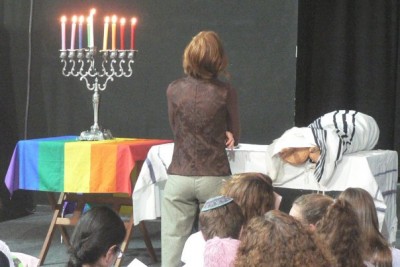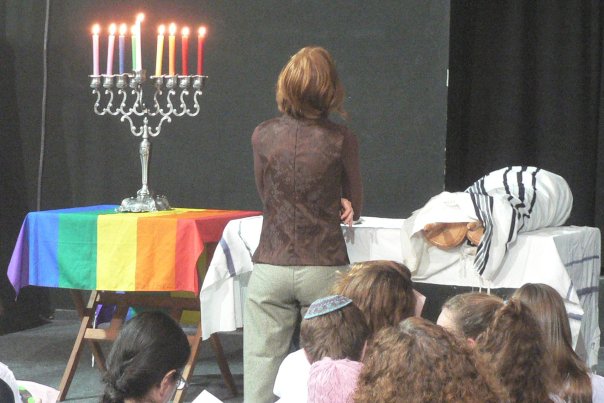
My egalitarianism started out as a compromise: it gave me most of the traditional liturgy and observance I’d grown up around, while also giving me the modernity and progressive attitudes I’d been surrounded by for most of my life. It allowed me to cling to the tradition of my childhood and the feminism and liberalism of my adolescence. When I attended my first traditional egalitarian/Conservative/Masorti service the summer before I entered eleventh grade — the first non-Orthodox service I had ever attended — I felt, in equal parts, uncomfortable and comfortable for the same reason: Egalitarianism felt unfamiliar specifically because it felt familiar to my modern values.
My progression toward an identifying with traditional egalitarian communities correlated very closely with my coming out of the closet and beginning to understand the problems that I realized I, as a queer person, posed. It also correlated very closely with my beginning to think and talk critically about gender and sexuality and my identity as a feminist.
My progression toward egalitarianism was not just because I felt more comfortable among people who were theologically and practically more similar to myself, but also because it felt like the right thing for me to do religiously. I might have leaned toward egalitarianism because it gave me a space where I felt I could exist as a queer person and a feminist, but also because it gave me the opportunity to feel that I was not invisible amongst my predominantly heterosexual peers. In the end, I am not egalitarian because of my female counterparts or my feminism: I am egalitarian because it is the right thing for me on a deeply personal and spiritual level.
Egalitarianism was never threatening to me. Egalitarianism did not make me invisible because women were now my equals. It did the opposite: it made me visible. As a community that was progressive—and proud—in its approach to the inclusion of women, it allowed me to find a way to become visible in a movement where I had previously felt invisible because I wasn’t able to voice the concerns that I had as a queer person and an agnostic (maybe?).
In a movement that is losing members because it is ostensibly making men disposable with increasing egalitarianism, I, a man, found my home because I was able to synthesize my modern values with my commitment to tradition. And if this Jewish manhood is defined as being different from women in Jewish spaces at the expense of their full participation, then that is a masculinity in which I want no part.
If we are ready to critique Muslim men for the atrocities they commit against women in the name of masculine honor, then we must be equally ready to critique those who say Jewish masculinity must be defined in terms of superiority to women in our ritual spaces. I am not feminized or emasculated by egalitarianism, as Avi Woolf suggested last week in responses to USY’s decision to reword its constitution. Instead, it empowers me. It shows me that Jewish innovation did not die with medieval rabbis who saw it as their duties to make sure that Judaism stayed alive through their innovations.
To be clear: I don’t believe that Orthodoxy, or Jewish life that is segregated by gender, cannot be feminist, or that it is even misogynistic — and organizations like JOFA and the prolific writing of my Orthodox feminist colleagues can prove this point better than I ever could. Nor do I take issue with men who are part of non-egalitarian communities because they feel more spiritually fulfilled there. What I see as dangerous is the notion that our identities as Jewish men must be tied directly to the idea that we must be different, unique, or above women. It is when we, as men, believe that we are above women in a hierarchy and we let this become a defining feature of our masculinity that we enter into misogyny.
We feminist Jewish men must work toward creating a Jewish masculinity that does not feel threatened, as Woolf and so many other like him, do by the presence and recognition of women in our communities. We must create a masculinity that has creative, positive attitudes toward different genders and sexual identities instead, and where we are valued by our abilities and our uniqueness, not because of our masculinity.
In truth, this prospect of creating a radically different vision of masculinity and men’s roles in Jewish communal life is scary because it requires men to relinquish the idea that their gender determines their uniqueness in Judaism. It is only then that we can create an identity and construct a masculinity that is not threatened by the presence and the needs of women. Reinforcing these notions of a normative masculinity, predicated upon superiority to women and other marginalized religious groups, does not make men more comfortable, either: it alienates those of us who never felt part of that normative masculinity in the first place, and places unrealistic expectations on the men in our communities to step up and seek the validation they are told they need to have. This only perpetuates the cycle of misogyny and exclusion. Ultimately, this forcing of normative masculinity is not only alienating women, but also many men. And our communities are the worse off for it.
I refuse to let my masculinity hinge upon being special or feeling needed. I refuse to see myself as disposable because I am a part of communities where women are my equals in prayer and ritual in the same way that they participate in all other parts of society. I am not unneeded.
Amram Altzman is a student at List College.

